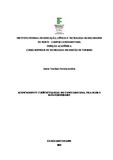| dc.creator | Silva, Otavio Tertuliano Ferreira da | |
| dc.date.accessioned | 2021-09-01T17:16:46Z | |
| dc.date.available | 2021-04-26 | |
| dc.date.available | 2021-09-01T17:16:46Z | |
| dc.date.issued | 2021-04-12 | |
| dc.identifier.uri | http://memoria.ifrn.edu.br/handle/1044/2069 | |
| dc.description.abstract | Illegal tourism is a reality as well as legal tourism. However, some questions arise: How is the
illegal tourist agency carried out? How can a person autonomously: plan, execute, control and
evaluate this arrangement of services? What skills and competencies are needed for this? How
to convince people to access this service? What is the target audience for these activities? And,
mainly, what are its acts and effects? The objective of this research was to investigate the illegal
tourist agency in the municipalities of Canguaretama, Vila Flor and Baía Formosa. This is a
qualitative, exploratory research. He sought to know this phenomenon and understand the
“make-know” of these social actors, who, based on their acquired knowledge and experiences
in the world, made tourist services feasible. Regarding the results achieved, it was found that
the illegal tourist agency is organized by people who, for the most part, do not have technical
or specialized knowledge. The modus operandi of these agents is to move people from the
source to the tourist destination and then from the tourist destination to the source. The illegal
agent is able to market their products at an affordable price, as it circumvents the legislation
and does not collect taxes on the provision of services. This type of agency does not guarantee
the consumer's rights. There is no formal bilateral contract, it is a service provision without
legal certainty. The interviewed agents did not formalize any type of company, therefore they
do not have CPNJ, they do not constitute a tourism agency and they do not have a registration
with the Ministry of Tourism. Finally, it is concluded that the absence of inspection actions by
the Union, States and Municipalities establishes a fertile environment for illegal tourist agency
- an economic and social phenomenon that negatively impacts tourism agencies. | pt_BR |
| dc.language | por | pt_BR |
| dc.publisher | Instituto Federal de Educação, Ciência e Tecnologia do Rio Grande do Norte | pt_BR |
| dc.rights | Acesso Aberto | pt_BR |
| dc.subject | Agência de viagem | pt_BR |
| dc.subject | Agenciamento turístico | pt_BR |
| dc.subject | Ilegal | pt_BR |
| dc.title | Agenciamento turístico ilegal em Canguaretama, Vila Flor e Baía Formosa/RN | pt_BR |
| dc.type | Trabalho de Conclusão de Curso | pt_BR |
| dc.creator.Lattes | . | pt_BR |
| dc.contributor.advisor1 | Ferreira, Fellipe José Silva | |
| dc.contributor.advisor1Lattes | http://lattes.cnpq.br/6721220601921124 | pt_BR |
| dc.publisher.country | Brasil | pt_BR |
| dc.publisher.department | Canguaretama | pt_BR |
| dc.publisher.initials | IFRN | pt_BR |
| dc.description.resumo | O turismo ilegal é uma realidade assim como o turismo legalizado. Todavia, surgem algumas
questões: Como é realizado o agenciamento turístico ilegal? Como uma pessoa consegue, de
forma autônoma: planejar, executar, controlar e avaliar este arranjo de serviços? Quais são as
habilidades e competências necessárias para tal? Como convencer as pessoas a acessarem este
serviço? Qual é o público-alvo destas atividades? E, principalmente, quais são seus impactos e
efeitos? O objetivo desta pesquisa foi investigar o agenciamento turístico ilegal nos municípios
de Canguaretama, Vila Flor e Baía Formosa. Esta é uma pesquisa qualitativa, do tipo
exploratório. Buscou conhecer este fenômeno e compreender o “fazer-saber” desses atores
sociais, que a partir de seus conhecimentos adquiridos e experiências no mundo conseguem
viabilizar serviços turísticos. Sobre os resultados alcançados, constatou-se que o agenciamento
turístico ilegal é organizado por pessoas que, em sua maioria, não possuem conhecimento
técnico ou especializado. O modus operandi desses agenciadores é deslocar as pessoas da
origem até o destino turístico e, em seguida, do destino turístico para a origem. O agenciador
ilegal consegue comercializar os seus produtos com preço acessíveis, pois burla a legislação e
não recolhe impostos sobre a prestação de serviço. Este tipo de agenciamento não garante os
direitos do consumidor. Não há um contrato bilateral formal, é uma prestação de serviço sem
segurança jurídica. Os agenciadores entrevistados não formalizaram nenhum tipo de empresa,
portanto não possuem CNPJ, não constituem agência de turismo e não tem cadastro no
Ministério do Turismo. Por fim, conclui-se que a ausência de ações de fiscalização por parte da
União, Estados e Municípios estabelece um ambiente fértil para o agenciamento turístico ilegal
- um fenômeno econômico e social que impacta de forma negativa as agências de turismo. | pt_BR |




